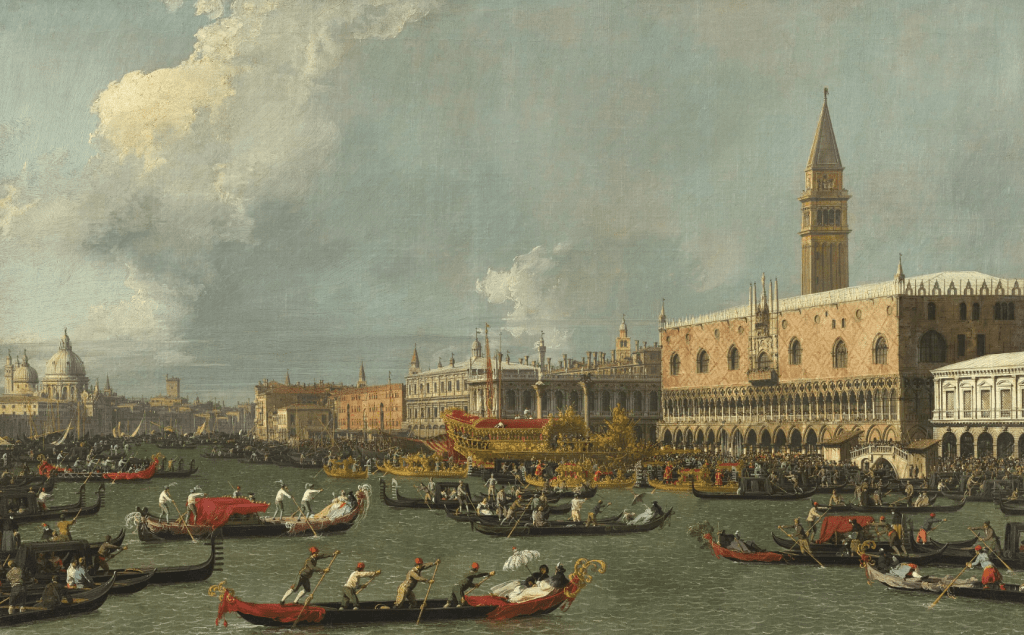[ad_1]
To obtain Morning Links in your inbox each weekday, signal up for our Breakfast with ARTnews publication.
Good Morning!
- Puck and ARTDAI have compiled lists of the highest 50 artists by public sale quantity, numbers of tons offered, and high costs.
- Artnet Information’s Eileen Kinsella canvases Previous Masters sellers for why Canaletto’s Venice view offered for $43.9 million final month.
- And one other essay—not by Dean Kissick—on the connection between identification politics and artwork.
The Headlines
NUMBER CRUNCHING. For a new report launched through Puck Wednesday night, artwork knowledge agency ARTDAI analyzed public sale knowledge for the primary half of 2025 to generate the High 50 promoting artists by whole public sale quantity, variety of tons offered, total hammer ratio, and the highest worth achieved for the artist. The outcomes, downloadable here, recommend that consumers are “critically pursuing works made by traditionally important artists—some residing, many useless [and] it seems that we’re simply at first of the cycle.” Based on Puck‘s Marion Manneker, consumers are additionally chasing lower-value works “at a reasonably strong clip, they usually’re not afraid to bid for the works they need—although we might not be seeing as many high-value purchases as we’ve prior to now.” The largest offers, it appears, are taking place privately—however there’s no approach to affirm them. “Nonetheless, the concept that consumers have misplaced curiosity in artwork doesn’t actually make sense once you see this knowledge,” he writes. “They’ve simply turned their focus to undervalued works, and that longer-term venture appears to be constructing momentum.”
‘UNASHAMEDLY 18TH-CENTURY.’ In a pleasant segue from the above, Artnet Information’s Eileen Kinsella tried to get to the bottom of why Canaletto’s Venice, the Return of the Bucintoro on Ascension Day (circa 1730) offered for “a whopping” £31.9 million ($43.9 million) at Christie’s final month, smashing the artist’s public sale file. The article, which sources opinions from a number of Previous Masters specialists, asks questions like, Is it the right image? How did shortage affect the worth? However, in response to seller Nicholas Corridor, it was all the above: “Its glittering Downing Avenue provenance [once owned by a British prime minister], its over-the-top composition with each conceivable Venetian ingredient thrown into the combo, and its spectacular scale [make it] the final word trophy purchase,” he mentioned. “However, nonetheless, it was unashamedly 18th-century in date and style and had a excessive assure. That didn’t inhibit a few of the most spirited, aggressive bidding seen at an Previous Grasp public sale for a few years.”
The Digest
Present exhibitions on the Nationwide Gallery Singapore and different establishments within the nation are presenting “a nuanced exploration of the island nation’s historical past because it continues to grapple with its colonial legacy.” [The Art Newspaper]
A courtroom has dominated that the Polish tradition minister’s resolution final 12 months to fireside the longstanding director of the Polish Historical past Museum (MHP) in Warsaw was illegal. The removing of Robert Kostro brought about widespread criticism on the time, with some accusing the federal government of political interference. [Notes from Poland]
Hayward Gallery Touring has tapped curator and author Ekow Eshun to steer the British Artwork Present 10, opening September 2026 in Coventry earlier than rolling out to Swansea, Bristol, Sheffield, and Newcastle Gateshead. [Artlyst]
Gaypalani Waṉambi has taken house Australia’s most prestigious First Nations artwork prize, and $100,000, for her paintings Burwu, blossom, which noticed her etch 1000’s of stringybark blossoms and bees. [The Guardian]
The Kicker
IDENTITY CRISIS. When Dean Kissick let off some steam in Harper’s Journal earlier this 12 months, arguing that identification politics has destroyed modern artwork, many stood as much as disagree with him. Steven Pie seems to be the newest; his latest article in ArtReview critiques the concept that artwork is dominated—and diminished—by identification politics. He questions whether or not identification has ever really formed artwork, arguing as a substitute that nice artwork transcends private identification, specializing in common themes and revolutionary expression. “Even the YBAs, ever represented as brash individualists, have been extra involved with problems with sustainability and historiography than these of identification,” he writes. “Tracey Emin’s tent, hand-stitched with the names of all these with whom she was shut, is a roll name of a number of epistemologies and methods of understanding. What’s in a reputation? she asks. The transportable housing mechanism of the tent itself additionally references local weather emergencies and displacement, embodying a ‘provider bag of fiction’ strategy to the artwork object. And: the tent is empty. Simply because the artist’s unmade mattress as an set up turns into a logo of a mattress—turns into everybody’s mattress—it appears this has at all times been the position identification performs in artwork. The artist may make the mattress, however we lie in it. Who’s within the mattress with you is as much as you.”
[ad_2]
Source link

